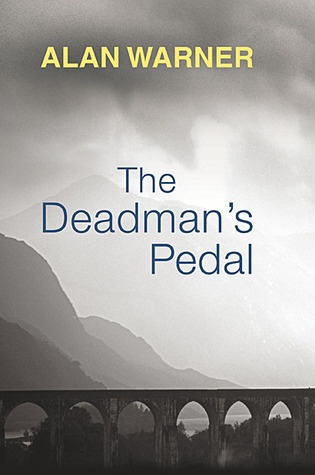Jim Morphy looks into the latest novel by Alan Warner, The Deadman’s Pedal which follows a 16-year-old Simon discovering how to be a man.

When Scotsman Alan Warner first picked up his pen he wanted to prove that a novel could be forged out of the small Highland community he’d grown up in. His 1995 award-winning debut, Morvern Callar, did this in spades. That book’s success can in large part be put down to what has become Warner’s customary stunning command of landscape and character, which gave a voice to, and insight about, a place and a people all too rarely explored in fiction.
Many of Alan Warner’s subsequent novels have stayed within this environment, with The Port – a fictionalised version of the west-coast town of Oban – being home to characters in works such as The Sopranos and its sequel The Stars in the Bright Sky.
Alan Warner’s seventh novel, the impressive, if flawed, coming-of-age tale The Deadman’s Pedal, sees the author again return to The Port to explore the dreams, dramas and harsh realities of those living small-town lives. Indeed, The Deadman’s Pedal can be seen as Warner’s most personal novel yet, even if he himself warns us off calling it autobiographical.
The book is set in the early 1970s, with the main narrative beginning as our 16-year-old protagonist Simon Crimmons is about to quit school against the wishes of his parents. We see him enjoying the start of his teenage summer: playing with friends, chasing a girl, and wandering the countryside. This is what he and his like know: ‘They had been at this for all their short lives -a youth spent under weathered skies in open and uninhabited lands, traversing the verdure according to the whim and urge.’
But our young lead wants more. Spending quiet time with his girlfriend-to-be Nikki offers only ‘the immoderate beginning of things not enough for Simon’. He yearns to enter adulthood and experience the things he knows little about but which he suspects may be more exciting than his current lot. This sense of change – be it people, places or politics – is a defining feature of the novel.
Simon’s grab for independence begins with him rebelling against his haulage company-owning Dad by taking a job on the railway. This conscious step down the community’s strict class-based hierarchy brings him into a world of jaded old men who are big on knife-edge banter but low on optimism. Simon will grow up quickly here, but he’ll have to look elsewhere for the excitement he craves.
Luckily for him, thrills soon come in the form of the aristocratic, ‘doomed family’ of the Bultitudes – the man of the great house at Broken Moan having the excellent title of Commander of the Pass. The bohemian son Alex gives Simon a glimpse into a world of psychedelic music, heady literature, cocktail bars and metropolitan living. But it is Alex’s enigmatic sister Varie (I’d shag her bedroom floor, says one boy, poetically) that Simon is most interested in.
Alan Warner neatly sets up these separate threads involving family, friends, workmates and lovers in order to explore Simon’s personal story as well as wider class and political issues. Some of these angles Warner pulls off more successfully than others. The school friend scenes are beautifully executed, with the shifting dynamics of teenage friendships neatly laid out. As was seen in The Sopranos, Warner has an uncanny knack for getting inside the scatter gun minds of teenagers.
The railway is the book’s heart. The dialogue recorded from inside the workplace and working men’s club is pitch-perfect, with Warner revelling in the anecdotes, rural myths, jokey banter and threats of the men. These scenes allow Warner to give a sense of the social climate of the time, with talk of union strikes and the erosion of the railway industry never far from people’s lips. Modernity is creeping up on 1970s rural Scotland, we see.
The scenes with the Bultitudes are the most problematic. The siblings, and their dealings with Simon, are never truly believable, and Warner’s normally immaculate powers for dialogue let him down when putting words in the mouths of the privileged duo of Alex and Varie. Indeed, Simon himself is a slightly disappointing creation. His innocence, while core to the book, often results in simple passivity, which, while believable, leads to a rather boring, not fully-formed protagonist. And his motivations appear to reach little beyond those that come from his loins – true of almost any teenage boy, but a little tiresome.
The different threads gently meander through the novel. Things can seem aimless, although this is often easy to ignore by simply enjoying Warner’s crafted prose, with its extensive use of dialect-heavy dialogue. What narrative urgency there is comes from a few expertly-handled set-pieces: workplace fights, family showdowns, railways accidents and ‘romantic’ evenings. Warner also gives us a neat literary trick, with a switchback in time for one of the otherwise chronological chapters, giving us reason to re-assess what we’ve just read.
When the novel’s major dramas do come, they come thick and fast, and for both Simon the train-driver and for Simon the lover, leading to a major quickening of pace as we near the book’s end. Thrilling, yes, if making the book seem a little uneven.
With The Deadman’s Pedal, Warner has shown again that there are tales aplenty in the Highlands. He has suggested that the novel is the first instalment of a trilogy about the shifting nature of Scotland’s psyche in recent decades. The Deadman’s Pedal is more than a solid start, but it’d be fair to hope for even better things next time around.
The Deadman’s Pedal by Alan Warner is out now.
Jim Morphy is a regular contributor to Wales Arts Review.












